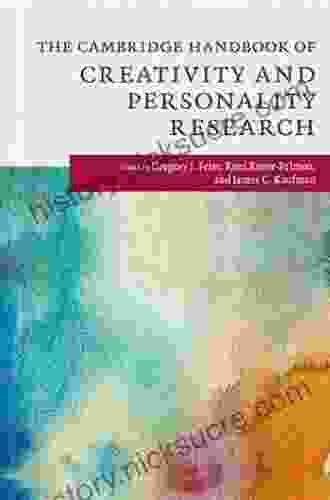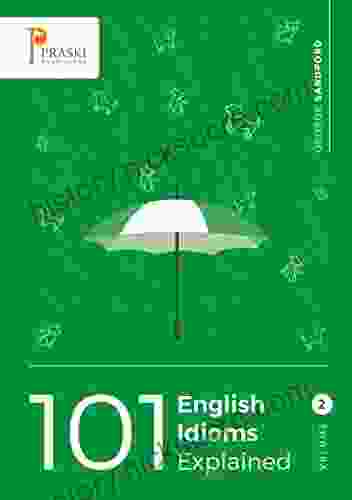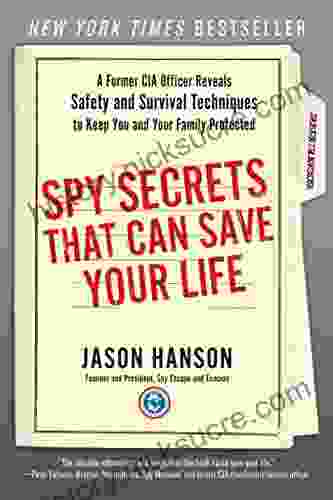The Cambridge Handbook of Creativity

The Cambridge Handbook of Creativity is a comprehensive guide to the latest research on creativity. It provides a comprehensive overview of the field, from the history of creativity research to the latest theories and methods. The handbook also includes a number of applications of creativity research, such as in education, business, and the arts.
4.8 out of 5
| Language | : | English |
| File size | : | 3937 KB |
| Text-to-Speech | : | Enabled |
| Enhanced typesetting | : | Enabled |
| Word Wise | : | Enabled |
| Print length | : | 733 pages |
| Screen Reader | : | Supported |
History of Creativity Research
The history of creativity research can be traced back to the early days of psychology. In the late 19th century, psychologists such as Francis Galton and James McKeen Cattell began to study the nature of creativity. They developed a number of tests to measure creativity, and they also began to investigate the relationship between creativity and other psychological factors, such as intelligence and personality.
In the early 20th century, creativity research continued to grow. Psychologists such as Carl Jung and Sigmund Freud began to explore the unconscious mind as a source of creativity. They developed a number of new theories of creativity, which emphasized the importance of imagination, intuition, and play.
In the mid-20th century, creativity research began to take a more scientific turn. Psychologists such as J.P. Guilford and E. Paul Torrance developed a number of new tests to measure creativity. They also began to investigate the role of the environment in creativity. They found that creativity is not simply a matter of individual talent, but that it can also be fostered by a supportive environment.
Theories of Creativity
There are a number of different theories of creativity. Some of the most influential theories include:
- The психодинамическая теория creativity, which emphasizes the importance of the unconscious mind in creativity.
- The когнитивная теория creativity, which emphasizes the importance of cognitive processes, such as problem-solving and imagination, in creativity.
- The социальная теория creativity, which emphasizes the importance of the social environment in creativity.
These are just a few of the many different theories of creativity. There is no single theory that can fully explain creativity, but each theory provides a different perspective on the creative process.
Methods of Creativity Research
There are a number of different methods that can be used to study creativity. Some of the most common methods include:
- Case studies, which involve studying the creative process of a particular individual or group.
- Experiments, which test the effects of different variables on creativity.
- Surveys, which collect data on the creative experiences of a large number of people.
Each of these methods has its own strengths and weaknesses. Case studies can provide a very detailed understanding of the creative process, but they can be difficult to generalize to other people. Experiments can provide more objective data, but they can be difficult to design and conduct. Surveys can collect data from a large number of people, but they can be difficult to interpret.
Applications of Creativity Research
Creativity research has a number of applications in a variety of fields, such as:
- Education, where creativity research can help to improve teaching and learning.
- Business, where creativity research can help to develop new products and services.
- The arts, where creativity research can help to understand the creative process.
Creativity is an essential human quality that can be used to solve problems, create new things, and improve the world around us. Creativity research can help us to better understand the creative process and to foster creativity in ourselves and others.
4.8 out of 5
| Language | : | English |
| File size | : | 3937 KB |
| Text-to-Speech | : | Enabled |
| Enhanced typesetting | : | Enabled |
| Word Wise | : | Enabled |
| Print length | : | 733 pages |
| Screen Reader | : | Supported |
Do you want to contribute by writing guest posts on this blog?
Please contact us and send us a resume of previous articles that you have written.
 Fiction
Fiction Non Fiction
Non Fiction Romance
Romance Mystery
Mystery Thriller
Thriller SciFi
SciFi Fantasy
Fantasy Horror
Horror Biography
Biography Selfhelp
Selfhelp Business
Business History
History Classics
Classics Poetry
Poetry Childrens
Childrens Young Adult
Young Adult Educational
Educational Cooking
Cooking Travel
Travel Lifestyle
Lifestyle Spirituality
Spirituality Health
Health Fitness
Fitness Technology
Technology Science
Science Arts
Arts Crafts
Crafts DIY
DIY Gardening
Gardening Petcare
Petcare Mark Kurlansky
Mark Kurlansky Diana Raab
Diana Raab Kelly Jensen
Kelly Jensen John N Maclean
John N Maclean Chris Carmichael
Chris Carmichael George Orwell
George Orwell Bernard Darwin
Bernard Darwin Jef Aldrich
Jef Aldrich David J Ley
David J Ley Mike Malaska
Mike Malaska Austin M Francis
Austin M Francis Gregg Braden
Gregg Braden Laura Taylor Namey
Laura Taylor Namey Laura Stamm
Laura Stamm 2nd Edition Kindle Edition
2nd Edition Kindle Edition Carl Sagan
Carl Sagan Walter H Gmelch
Walter H Gmelch Erik Molvar
Erik Molvar Marco Stiantoni
Marco Stiantoni Jason Reynolds
Jason Reynolds Tim Macwelch
Tim Macwelch Alessandra Belloni
Alessandra Belloni Shari Stauch
Shari Stauch Bradford Angier
Bradford Angier Mario Batali
Mario Batali Barbara Pachter
Barbara Pachter Susan Campbell Bartoletti
Susan Campbell Bartoletti Dr Lucie Rivera
Dr Lucie Rivera Alan Bass
Alan Bass Tom Wolfe
Tom Wolfe Caroline Gallup
Caroline Gallup Wyatt Mclaren
Wyatt Mclaren Irfan Ahmad
Irfan Ahmad Kindle Edition
Kindle Edition Stephanie Mcmurrich Roberts Phd
Stephanie Mcmurrich Roberts Phd Lj Andrews
Lj Andrews Carolyn Jessop
Carolyn Jessop Rael Isacowitz
Rael Isacowitz Dan Jones
Dan Jones Steve Bo Keeley
Steve Bo Keeley Marie Tillman
Marie Tillman Julyen Rose
Julyen Rose Daniel Bezman
Daniel Bezman Pharmacology University
Pharmacology University Jeremy Paxman
Jeremy Paxman Ennki Hakari
Ennki Hakari Stuart Tyson Smith
Stuart Tyson Smith Dawn Hogue
Dawn Hogue Jonathan Benson
Jonathan Benson Ji Kim
Ji Kim Virginia M Axline
Virginia M Axline Emma Frisch
Emma Frisch Richard Fortey
Richard Fortey Stella Cottrell
Stella Cottrell Lessie Myles
Lessie Myles David Robinson
David Robinson Jessica Dixie Mills
Jessica Dixie Mills Mark Woods
Mark Woods Jerry R Thomas
Jerry R Thomas Tommy Nelson
Tommy Nelson Gigi Sayfan
Gigi Sayfan Jessica Joelle Alexander
Jessica Joelle Alexander Daniel R Montello
Daniel R Montello Ta Nehisi Coates
Ta Nehisi Coates John S Mbiti
John S Mbiti Brett Friedman
Brett Friedman Philip Gerard
Philip Gerard Roger Kahn
Roger Kahn Gene Hamilton
Gene Hamilton Kristen Radtke
Kristen Radtke James Ori
James Ori Robin Horsfall
Robin Horsfall Headquarters Department Army
Headquarters Department Army Ken Setterington
Ken Setterington Marge Foley
Marge Foley Ian Freeman
Ian Freeman Meg Meeker
Meg Meeker Barbara Brown Taylor
Barbara Brown Taylor Jason Hanson
Jason Hanson Denny Emerson
Denny Emerson Thomas Celentano
Thomas Celentano Naoko Abe
Naoko Abe Ton Viet Ta
Ton Viet Ta Philip Mcmichael
Philip Mcmichael Second Edition Revised Kindle Edition
Second Edition Revised Kindle Edition Tom Igoe
Tom Igoe Rebecca Schiller
Rebecca Schiller Charles C Pinter
Charles C Pinter Michelle Oberman
Michelle Oberman Marcia Nathai Balkissoon
Marcia Nathai Balkissoon Sally Huss
Sally Huss Michael Wisehart
Michael Wisehart Abby Knox
Abby Knox Leigh Cowart
Leigh Cowart Ron Kittle
Ron Kittle Paul D Ellis
Paul D Ellis April Lara
April Lara Robert J Sternberg
Robert J Sternberg Deirdre Dolan
Deirdre Dolan Jordan Christy
Jordan Christy Michael A Cremo
Michael A Cremo Leon Edward
Leon Edward Mike Liner
Mike Liner Deborah Miller
Deborah Miller Aquila Chrysaetos
Aquila Chrysaetos Budd Bailey
Budd Bailey Erfun Geula
Erfun Geula Gary Paulsen
Gary Paulsen Julitta Korol
Julitta Korol Ken Adcock
Ken Adcock Michelle Segar Phd
Michelle Segar Phd Mark Broadie
Mark Broadie John Derbyshire
John Derbyshire Mila Markle
Mila Markle Eliana De Las Casas
Eliana De Las Casas William Murakami Brundage
William Murakami Brundage Art Smith
Art Smith Cynthia Chen Mcternan
Cynthia Chen Mcternan Philip Pullman
Philip Pullman Antonio Diego
Antonio Diego Ian Condry
Ian Condry Lindsay Powers
Lindsay Powers Mamma Margaret
Mamma Margaret Winifred Conkling
Winifred Conkling Lynn Marriott
Lynn Marriott Harvey Berman
Harvey Berman Hendrik Ebbers
Hendrik Ebbers Austyn Lee
Austyn Lee Tara Grayce
Tara Grayce Mr Michael Quilty Maguire
Mr Michael Quilty Maguire Prince Daniels Jr
Prince Daniels Jr Antonia Felix
Antonia Felix Chuck Carlson
Chuck Carlson Matt Appling
Matt Appling Gary Jobson
Gary Jobson Lara Kolawole
Lara Kolawole Douglas Riley
Douglas Riley Stephanie Dalley
Stephanie Dalley Karen Gravelle
Karen Gravelle Dm Fitzgerald
Dm Fitzgerald Mark Stavish
Mark Stavish Jenny Hall
Jenny Hall J R Ward
J R Ward Kathleen Hale
Kathleen Hale William Hanson
William Hanson Pedro Casal
Pedro Casal Steve Pease
Steve Pease Jenny B Jones
Jenny B Jones Odessa Gillespie Black
Odessa Gillespie Black Karema Mcghee
Karema Mcghee Anu Partanen
Anu Partanen Jeff Galloway
Jeff Galloway Derek Dellinger
Derek Dellinger Lou Paget
Lou Paget Victoria Duerstock
Victoria Duerstock Tracy Owens
Tracy Owens Jennifer Scribner
Jennifer Scribner Martha Cheng
Martha Cheng Ronald Mangravite
Ronald Mangravite Lenyfer Garrido
Lenyfer Garrido Peter Ballin
Peter Ballin Todd Michael St Pierre
Todd Michael St Pierre Carolyn Henry
Carolyn Henry Tina Nicastro Maom Lac
Tina Nicastro Maom Lac Eli Lizorkin Eyzenberg
Eli Lizorkin Eyzenberg Kay Elder
Kay Elder Territory Supply
Territory Supply Benny Lewis
Benny Lewis Michael Mccree
Michael Mccree Matthew M Hurley
Matthew M Hurley Jenny Moore
Jenny Moore Jackson Carter
Jackson Carter Joseph Distefano Iii
Joseph Distefano Iii Sean Poage
Sean Poage Rick L Huffman
Rick L Huffman Sahara Foley
Sahara Foley J Robert King
J Robert King Sara Wheeler
Sara Wheeler Harald E L Prins
Harald E L Prins Michael Wenz
Michael Wenz Julie Murphy
Julie Murphy Justin A Reynolds
Justin A Reynolds Aref Jeribi
Aref Jeribi Robert Clark
Robert Clark Katharine A Phillips
Katharine A Phillips Spanked Teen
Spanked Teen Yassine Tounsi
Yassine Tounsi James Atkinson
James Atkinson John J Donohue
John J Donohue John Vonhof
John Vonhof Benoit Mandelbrot
Benoit Mandelbrot Jonathan Robinson
Jonathan Robinson Paula Hendricks
Paula Hendricks Herbert Warren Wind
Herbert Warren Wind Bart Yasso
Bart Yasso Panos Y Papalambros
Panos Y Papalambros Zigzag English
Zigzag English Maya Angelou
Maya Angelou Peter Newby
Peter Newby Chelsea Hanson
Chelsea Hanson Melissa Wagner
Melissa Wagner Thema Bryant Davis
Thema Bryant Davis Jennifer Karnopp
Jennifer Karnopp Archie Kalokerinos
Archie Kalokerinos Corrine Morgan Thomas
Corrine Morgan Thomas Joy Jones
Joy Jones Paul Lockhart
Paul Lockhart Stephanie R Haynes
Stephanie R Haynes Estelle Frankel
Estelle Frankel Christina Thompson
Christina Thompson Marc Sedaka
Marc Sedaka Tashie Bhuiyan
Tashie Bhuiyan Linda Hibbs
Linda Hibbs Robbie Thompson
Robbie Thompson Kevin Salwen
Kevin Salwen Ogi Ogas
Ogi Ogas Charles C Patrick
Charles C Patrick James Porzio
James Porzio Richard Sale
Richard Sale Philip S Harrington
Philip S Harrington Sarah H Parcak
Sarah H Parcak Richard Griffith
Richard Griffith Cari Rosen
Cari Rosen H W Brands
H W Brands J Hannigan
J Hannigan Marty Smith
Marty Smith Kate Barrows
Kate Barrows James L Swanson
James L Swanson June Goulding
June Goulding Kevin Brunette
Kevin Brunette Anthony Idalion
Anthony Idalion Silvana Condemi
Silvana Condemi Amy R Carpenter
Amy R Carpenter Maia Szalavitz
Maia Szalavitz Jessica Wapner
Jessica Wapner Don Kirk
Don Kirk Susie Johns
Susie Johns Arrl Inc
Arrl Inc Sarah Guthals
Sarah Guthals Tamim Ansary
Tamim Ansary Andrew Miller
Andrew Miller Greg Cruthers
Greg Cruthers Shane Parrish
Shane Parrish Harvey Penick
Harvey Penick Elisabeth Sheff
Elisabeth Sheff Shavona L Floyd
Shavona L Floyd Simon Pridmore
Simon Pridmore Brian Morris
Brian Morris Giovanni Amato
Giovanni Amato Tigran Bagdasaryan
Tigran Bagdasaryan Sharon Begley
Sharon Begley Susan B Bastable
Susan B Bastable Gia Scott
Gia Scott Michelle Quach
Michelle Quach Inc Barcharts
Inc Barcharts Chris Albon
Chris Albon Martin Ganda
Martin Ganda Sasha Issenberg
Sasha Issenberg Patricia Ottaviano
Patricia Ottaviano Robert Wright
Robert Wright Joy Nash
Joy Nash Dan Michaelson
Dan Michaelson Herbert L Gravitz
Herbert L Gravitz Peggy A Houglum
Peggy A Houglum Russell Elkins
Russell Elkins Karen Newell
Karen Newell Philip C Plait
Philip C Plait Dr Mark Sircus
Dr Mark Sircus Joni L Mihura
Joni L Mihura Shannon O Gorman
Shannon O Gorman Mark Sundeen
Mark Sundeen Mark Fisher
Mark Fisher Doug Gelbert
Doug Gelbert Heather Renee
Heather Renee Richard Eng
Richard Eng Supersummary
Supersummary Lauren Kahl
Lauren Kahl Jody Houser
Jody Houser Dave Rineberg
Dave Rineberg Laurie Halse Anderson
Laurie Halse Anderson Mark Harper
Mark Harper My Daily Russian
My Daily Russian R Scott Jones
R Scott Jones George J Sanchez
George J Sanchez Stephen Joseph
Stephen Joseph Colleen Doyle Bryant
Colleen Doyle Bryant David J Anderson
David J Anderson Jacki Pritchard
Jacki Pritchard Ruth Albee
Ruth Albee Jessie James Decker
Jessie James Decker Cara Natterson
Cara Natterson Samantha Michaels
Samantha Michaels Craig Caudill
Craig Caudill Sophie Gonzales
Sophie Gonzales Sara Lyon
Sara Lyon Shanaya Summer
Shanaya Summer Zac Williams
Zac Williams Erin Gruwell
Erin Gruwell Jane R Hirschmann
Jane R Hirschmann Jennifer M Bay Williams
Jennifer M Bay Williams Go Books
Go Books Markus Zusak
Markus Zusak Louie Giglio
Louie Giglio You Fuguruma
You Fuguruma Antony Felix
Antony Felix Jim Ross
Jim Ross Melissa Sperka
Melissa Sperka Hamish Haswell Smith
Hamish Haswell Smith Regan Parker
Regan Parker Jerzy Jezierski
Jerzy Jezierski Nancy Clark
Nancy Clark Susy Callory
Susy Callory Carrie Shuchart
Carrie Shuchart John Snygg
John Snygg Donald Frias
Donald Frias Krysten Harlow
Krysten Harlow Jennifer Comeaux
Jennifer Comeaux Richard A Horsley
Richard A Horsley Nystce Exam Secrets Test Prep Team
Nystce Exam Secrets Test Prep Team Gina Ford
Gina Ford Miles Olson
Miles Olson Carleen Eaton
Carleen Eaton Elton Moraes
Elton Moraes Henry Bennett
Henry Bennett Jacqueline Melvin
Jacqueline Melvin John Booss
John Booss Melyssa St Michael
Melyssa St Michael Antoine Savine
Antoine Savine Gaia Vince
Gaia Vince Proper Education Group
Proper Education Group Sherry Thomas
Sherry Thomas Joe Oswald
Joe Oswald Steven L Emanuel
Steven L Emanuel Stephen Robson
Stephen Robson Jayne Storey
Jayne Storey Robert Solomon
Robert Solomon Michael J Hathaway
Michael J Hathaway Thomas H Davenport
Thomas H Davenport Chris Duff
Chris Duff Joe Kelsey
Joe Kelsey Anya Hayes
Anya Hayes Helen Leigh
Helen Leigh Emilio Iodice
Emilio Iodice Eric Coll
Eric Coll Daniela Sacerdoti
Daniela Sacerdoti Simon Singh
Simon Singh Jim Gourley
Jim Gourley Craig Storti
Craig Storti Reynaldo S Galang
Reynaldo S Galang Randy Gerke
Randy Gerke Joe Brooks
Joe Brooks Keiko Tobe
Keiko Tobe Creek Stewart
Creek Stewart Jeff Mayers
Jeff Mayers Eugene V Resnick
Eugene V Resnick Nigel Foster
Nigel Foster Bill Keenan
Bill Keenan Laurence Gardner
Laurence Gardner Tasha Powers
Tasha Powers Tom Burns
Tom Burns Richard Grant
Richard Grant Ehren Myers
Ehren Myers Grant Cunningham
Grant Cunningham Roberta M Gilbert
Roberta M Gilbert Tharik Hussain
Tharik Hussain Erving Goffman
Erving Goffman Dan Blanchard
Dan Blanchard Jean Anthelme Brillat Savarin
Jean Anthelme Brillat Savarin Dianne Lake
Dianne Lake Brandon Royal
Brandon Royal Joshua Enyart
Joshua Enyart Robert J Sweet
Robert J Sweet Conn Iggulden
Conn Iggulden Craig L Farnsworth
Craig L Farnsworth Felicity Pulman
Felicity Pulman George Kimball
George Kimball Bonnie Landry
Bonnie Landry Antonia Bolingbroke Kent
Antonia Bolingbroke Kent Liz Lee Heinecke
Liz Lee Heinecke Steve Sheward
Steve Sheward Julie Hall
Julie Hall Michael Pearle
Michael Pearle Peter Nabokov
Peter Nabokov Karl F Kuhn
Karl F Kuhn Gary Morris
Gary Morris Joseph F Healey
Joseph F Healey Robert B Stone
Robert B Stone Cheng Liu
Cheng Liu Donald B Deyoung
Donald B Deyoung Ernest Thompson Seton
Ernest Thompson Seton Claudia Sanborn
Claudia Sanborn Clara E Hill
Clara E Hill Charlie Meyers
Charlie Meyers Abbi Glines
Abbi Glines Justi Carey
Justi Carey Michael Symon
Michael Symon P J Capelotti
P J Capelotti William Lanouette
William Lanouette Katie Rain Hill
Katie Rain Hill Liz Wiseman
Liz Wiseman Michael Tyler
Michael Tyler Lawrence J Cohen Phd
Lawrence J Cohen Phd The Pinnacle Review
The Pinnacle Review Michael Morgan
Michael Morgan Heather Turgeon
Heather Turgeon Theodore Kendris
Theodore Kendris Fiore Tartaglia
Fiore Tartaglia Anya Kuvarzina
Anya Kuvarzina Dennis J Sweeney
Dennis J Sweeney Joe Farinaccio
Joe Farinaccio 1st Ed 2020 Edition Kindle Edition
1st Ed 2020 Edition Kindle Edition Tim Collins
Tim Collins Geraldine Brooks
Geraldine Brooks Corey Wade
Corey Wade Megan Whalen Turner
Megan Whalen Turner Torre Deroche
Torre Deroche Colleen Hoover
Colleen Hoover Julie Tallard Johnson
Julie Tallard Johnson John Miller
John Miller Sherry Blackman
Sherry Blackman Stephen E Dew
Stephen E Dew David Warriner
David Warriner Colin Stroud
Colin Stroud Henrik Gert Larsen
Henrik Gert Larsen Phil Genova
Phil Genova Roger Guay
Roger Guay Paige Rawl
Paige Rawl Mira Ptacin
Mira Ptacin James C Dobson
James C Dobson Louise Douglas
Louise Douglas Jean Beaman
Jean Beaman Marie Lu
Marie Lu Arous Brocken
Arous Brocken David Klausmeyer
David Klausmeyer Jason Brick
Jason Brick Peggy Mohan
Peggy Mohan Rebecca Stobaugh
Rebecca Stobaugh Chandelle Lavaun
Chandelle Lavaun Revised Edition Kindle Edition
Revised Edition Kindle Edition Sonia Weyers
Sonia Weyers Jen L Grey
Jen L Grey Harry Vardon
Harry Vardon Karen Ehman
Karen Ehman Grayson Sinclair
Grayson Sinclair Peter Aitchison
Peter Aitchison Steve Raible
Steve Raible Kimberly Seals Allers
Kimberly Seals Allers Frank Close
Frank Close Christopher Van Tilburg
Christopher Van Tilburg James Cordrey
James Cordrey Jon Finkel
Jon Finkel Iain Mcgilchrist
Iain Mcgilchrist Antony Cummins
Antony Cummins Justin Goldman
Justin Goldman J T Burns
J T Burns Ariella Moon
Ariella Moon Rick Riordan
Rick Riordan Jodi Lee
Jodi Lee Paul Ortiz
Paul Ortiz Michael Walker
Michael Walker Db King
Db King George Sandford
George Sandford Pat Brooks
Pat Brooks
Light bulbAdvertise smarter! Our strategic ad space ensures maximum exposure. Reserve your spot today!
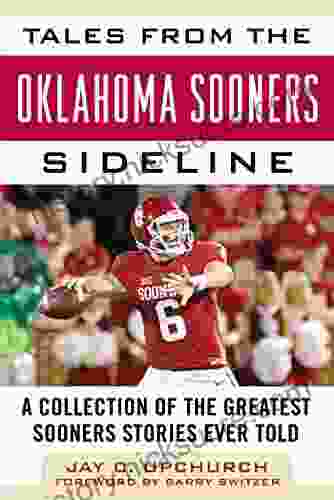
 Terry PratchettTales From The Oklahoma Sooners Sideline: A Look Inside the Legendary Program
Terry PratchettTales From The Oklahoma Sooners Sideline: A Look Inside the Legendary Program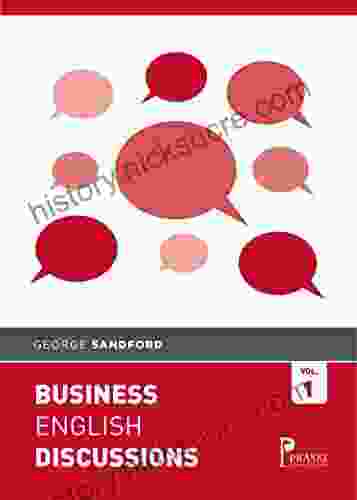
 Eric NelsonThe Ultimate Guide to Effective Business English Discussions: A Comprehensive...
Eric NelsonThe Ultimate Guide to Effective Business English Discussions: A Comprehensive... Ian MitchellFollow ·8k
Ian MitchellFollow ·8k Vic ParkerFollow ·18.6k
Vic ParkerFollow ·18.6k Gary ReedFollow ·18.4k
Gary ReedFollow ·18.4k Gene SimmonsFollow ·3.1k
Gene SimmonsFollow ·3.1k Gabriel MistralFollow ·12.5k
Gabriel MistralFollow ·12.5k Wesley ReedFollow ·5.6k
Wesley ReedFollow ·5.6k Eugene ScottFollow ·5.1k
Eugene ScottFollow ·5.1k Nathaniel HawthorneFollow ·11.7k
Nathaniel HawthorneFollow ·11.7k
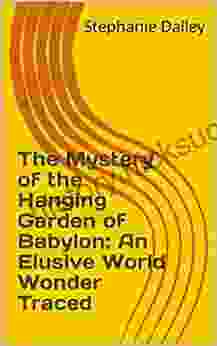
 Bernard Powell
Bernard PowellAn Elusive World Wonder Traced
For centuries, the...

 Samuel Ward
Samuel WardAce Your Motorcycle Permit Test: 300 Essential Questions...
Obtaining a...
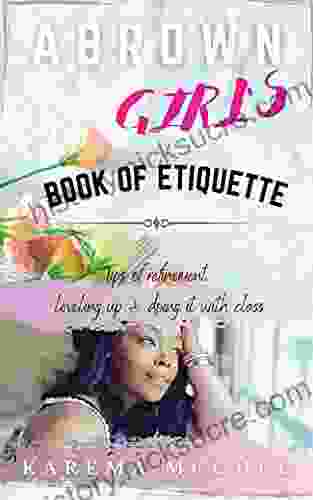
 Boris Pasternak
Boris PasternakTips for Leveling Up Refinement: Doing it With Class
Refinement is a...
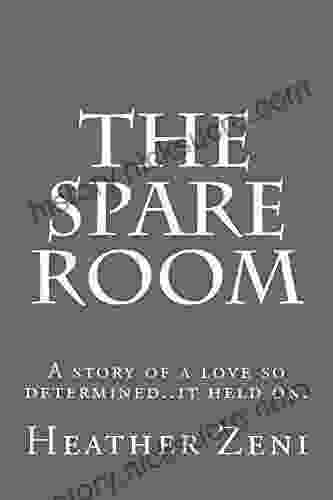
 Willie Blair
Willie BlairThe Spare Room: A Haven for Art and Creativity in London
The Spare Room is a unique and inspiring...
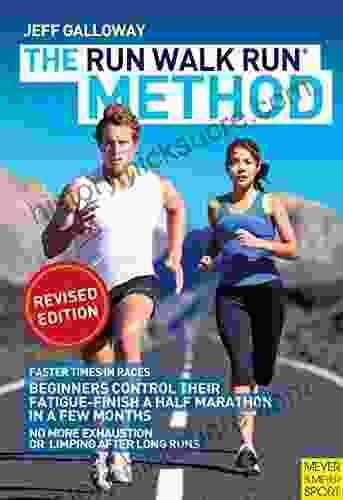
 Howard Blair
Howard BlairThe Run-Walk-Run Method: Your Gateway to Running Success
Unlock Your Inner Runner ...
4.8 out of 5
| Language | : | English |
| File size | : | 3937 KB |
| Text-to-Speech | : | Enabled |
| Enhanced typesetting | : | Enabled |
| Word Wise | : | Enabled |
| Print length | : | 733 pages |
| Screen Reader | : | Supported |


